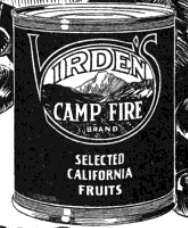Difference between revisions of "Virden Packing"
| Line 38: | Line 38: | ||
| − | Two other early employees - Laney and W. P. Mullen - were part of Berkeley's [[Sunlit Fruit Company]] which had been absorbed by the [[California Packing Corporation]]. Mullen wrote about Virden's Marysville cannery and marketing plan in the [http://books.google.com/books?id=cRAdAQAAMAAJ&lpg=RA4-PA5&ots=16c1CcVvDp&dq=virden%20packing&pg=RA4-PA5#v=onepage&q=virden%20packing&f=false October 1921 Western Canner and Packer]. | + | Two other early employees - [[F. E. Laney]] and W. P. Mullen - were part of Berkeley's [[Sunlit Fruit Company]] which had been absorbed by the [[California Packing Corporation]]. Mullen wrote about Virden's Marysville cannery and marketing plan in the [http://books.google.com/books?id=cRAdAQAAMAAJ&lpg=RA4-PA5&ots=16c1CcVvDp&dq=virden%20packing&pg=RA4-PA5#v=onepage&q=virden%20packing&f=false October 1921 Western Canner and Packer]. |
==Locations== | ==Locations== | ||
Revision as of 06:35, 15 January 2015
Lua error: Internal error: The interpreter exited with status 126.
The Virden Packing Company was a meat and fruit canner and fruit packer with origins in Sacramento but eventually headquartered in San Francisco. The Virden Company was incorporated in 1919[1]. The company started out as a meat packer, but expanded in 1919-1922 into the canned fruit business, describing themselves as "A New California Packer"[2]. Supposedly, peaches was one of their specialties. Both meat and fruit were canned under the Campfire brand[3].
The company had major stockyards in South San Francisco (next to Swift)[4] and Sacramento. Starting around 1920, Virden bought several canneries in succession, first buying Emeryville's Western Canning in May 1921[5] from the Chinese-American Mee family. They then bought United Canneries of Oakland at the foot of 9th Street in 1922, according to February 1922 Canning Age The United Canneries plant had cost $500,000 to build, and had a capacity of 400,000 cases. "H.L. Lafler, industrial engineer, undertook the transfer." Virden also bought the then-idle Salsina Packing and Canning Company on Lincoln Ave. in San Jose for $115,000, hoping to use it for fruit and meat canning[6]. Wholesale Grocery Review says that 8,000 tons of fruit will be canned there. There were also signs that Virden owned Pioneer Fruit Company in 1920's according to lawsuit from Zellerbach Paper going after Virden for unpaid bills. Virden also canned olives for the California Olive Growers Association according to Pacific Rural Press, Oct. 15, 1921. Western Canner and Packer similarly mentioned that they'd be handling the entire pack for the association through the Emeryville and Tulare canneries.
The company also planned a cannery in Sutter or Yuba County according to November 1921 Canning Age. The area had been shipping 2000 carloads of fruit to San Jose in previous years. The Marysville cannery opeed in July 1922 according to Western Canner and Packer
The company's rapid growth quickly cooled, with the various plants sold off in 1926 and 1927. Balfour Guthrie took option to buy packing plants in May 1926-Marysville, San Jose, Elmhurst, Fruitvale, and Emeryville. The Salsina plant supposedly went to Balfour Guthrie. The Marysville plant was listed as Balfour Guthrie on 1932 Sanborn. Virden's meat packing houses in Sacramento and South San Francisco were kept, but several lawsuits in the 1930's claimed that Virden didn't build all the meat packing businesses that they said when they issued stock. Virden's meat packing houses in South San Francisco and perhaps elsewhere were sold in May 1935 to Armour.
Balfour Guthrie's ownership of the Virden canneries was short; by September, their five canneries had been sold to the " Sterling Company", a subsidiary of the California Packing Corporation. Balfour Guthrie's purchase in May 1927 had been a lease-purchase agreement, with a year's option to purchase the company[7].
Charles Virden, the founder, had been general manager of California Fruit Distributors for several years at Sacramento. National Provisioner magazine of 1922 wrote about the annual meeting, and stated that the company was based in San Francisco but Charles E. Virden was from Sacramento. Virden moved to San Francisco in 1921 according to Western Canner and Packer Virden was a booster, active both in Sacramento and San Francisco. He spoke out on subjects of interest, such as freight car shortages.
Two other early employees - F. E. Laney and W. P. Mullen - were part of Berkeley's Sunlit Fruit Company which had been absorbed by the California Packing Corporation. Mullen wrote about Virden's Marysville cannery and marketing plan in the October 1921 Western Canner and Packer.
Locations
| Location | Years | Address | Details |
|---|---|---|---|
| Elmhurst | 1922, 1926 | Foot of 85th Street. | |
| Emeryville | 1919, 1922, 1926, 1927 | Park Ave | |
| Fruitvale[8] | 1925, 1926, 1927 | 1100 29th Street | Became Del Monte. |
| Lindsay | 1922, 1926 | ||
| Marysville | 1922, 1926 | 520 Olive Street | Still exists. |
| Oroville | 1922, 1926 | Used by Hearst to pack 1926 crop of peaches. | |
| Sacramento | 1922 | ||
| San Francisco | 1922 | ||
| San Jose | 1926, 1928, 1932 | 868 Auzerais Street | |
| South San Francisco | 1932 |
Photos
References
- ↑ New Factor Enters California Industry. August 1921 Canning Age
- ↑ May 1922 Western Canner and Packer
- ↑ Advertisement, August 1922 Western Canner and Packer
- ↑ South San Francisco history
- ↑ June 1921 Canning Age and July 1921 Canning Age
- ↑ California Canneries: [March 1922 Western Canner and Packer]
- ↑ Five Virden Canneries Purchased By Sterling Co. for $3,500,000. September 14, 1927 Oakland Tribune.
- ↑ Oakland 1926 directory
